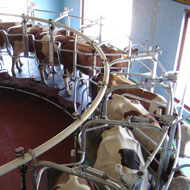Dairy farmer numbers could halve in 10 years

In December 2014 alone, 60 dairy farmers left the industry.
In just 10 years there could be fewer than 5,000 dairy farmers in England and Wales - half the current number - the National Farmers' Union (NFU) has warned.
As a result of ongoing milk price cuts, some farmers are now receiving just 20 pence per litre (ppl), yet farm costs are 36 per cent higher than they were eight years ago. Furthermore, the cost of animal feed has doubled since 2007.
NFU president Meurig Raymond commented: "This combination has left many producers under extreme financial pressure and fearing for the future of their dairy businesses."
In December 2014 alone, 60 dairy farmers left the industry. Just under 10,000 dairy producers remain, which is half the number there were in 2002. By 2025, NFU predicts the number could halve again if the current situation continues.
Rob Harrison, NFU's dairy board chairman, said: "I, like my colleagues on the NFU dairy board, are completely appalled by the ongoing price cuts crippling our industry and we are working hard to support our members and their businesses in every way we can."
The latest blow to the dairy farming sector came last week when First Milk announced it would delay payments to dairy farmers by two weeks.
NFU has been in urgent talks with the dairy company and has said its time scales are "unacceptable".
Mr Raymond said that while the global downturn in milk prices cannot be reversed, there are steps that can be taken to improve the situation for dairy farmers.
"We will continue our difficult but necessary discussions with all the processors as well as with retailers. What we want is an economically sustainable dairy industry for the future.
"As farmers face volatile markets, I’m also convinced that the government can do more to help by ensuring its policies are sympathetic to the current situation and will help farmers and farming businesses continue forwards."



 HMRC has invited feedback to its communications regarding the employment status of locum vets and vet nurses.
HMRC has invited feedback to its communications regarding the employment status of locum vets and vet nurses.